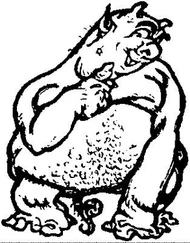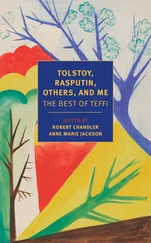In the first issue of Novaia zhizn ’, Teffi’s sketch, “October 18,” vividly depicts—using visual iconography common in revolutionary art—the masses united in a “mighty and triumphant procession,” their red banners outlined against the sky “like gigantic dark streams of resurrected triumphant blood.” [11] “18 oktiabria,” Novaia zhizn’ , Oct. 27, 1905 (no. 1): 7.
She pictures the unity of all classes: “A soldier, a lady in white gloves, a worker, an officer,” etc., and at the end returns to the banners, which “lead their people, their great host, forward, through the black night, to a new dawn, to a new life.” Teffi published several more pieces in Novaia zhizn’ , but relations between the literary staff and the Bolsheviks, strained from the start, became worse when Lenin arrived from exile in November 1905. Finally, when Novaia zhizn’ became no more than a Party organ, the entire literary section, including Teffi, resigned. This negative experience left a permanent mark, and accounts for her hostility toward the Bolsheviks—and Lenin in particular—in 1917. [12] For Teffi’s retrospective view of Novaia zhizn’ and the Bolsheviks, see “45 let,” Novoe russkoe slovo , June 25, 1950 (no. 13939): 2; “ ’Novaia zhizn’’,” NRS , July 9, 1950 (no. 13953): 2. For an English translation, see Tolstoy, Rasputin, Others, and Me (NYRB, 2016).
Between 1906 and 1908 Teffi’s political satire continued to appear in other opposition periodicals, but with time it grew milder, due in part to greater government restrictions, but also, no doubt, to fading revolutionary fervor. Russia was tired of all that solemnity, she wrote in 1910, and was longing for laughter:
Laughter is now in style […] Books of humor go through three editions in three or four months and demand for them keeps rising. Humor magazines are alluded to even in speeches delivered under the bell of the State Duma. Theatrical entrepreneurs are longing for a good merry comedy and beg tearfully, “Why, write something, the kind of thing that makes your throat begin to tickle with laughter!” [13] “Smekh,” Russkoe slovo , Nov. 18 (Dec. 1), 1910: 2.
The demand for laughter coincided perfectly with Teffi’s special gift, and it accounts for the renown she achieved during her final decade in Russia. The first print organ that spread her fame was Satirikon (Satyricon), the best Russian humor magazine of the early twentieth century, conceived of in 1908 by Arkady Averchenko (who in Memories is Teffi’s traveling companion from Moscow to Kiev). With its very talented staff of writers and artists, Satirikon was a resounding success, and Teffi and Averchenko became its most celebrated writers. Her popularity grew still greater in 1909 when she became a feuilletonist for the Moscow-based Russkoe slovo (Russian Word), the most widely read and highly regarded newspaper in Russia, whose circulation reached over a million by 1917. Her Sunday columns—which included both topical feuilletons and stories—appeared in Russkoe slovo until it was closed by the Bolsheviks in 1917.
Teffi published her first books in 1910, and they reflect the two sides of her talent. The first, Seven Fires , is a volume of poetry plus a play written in orientalized prose; the second was entitled Humorous Stories . [14] Iumoristicheskie rasskazy (SPb: Shipovnik, 1910).
The poetry received mixed reviews, but the stories were universally praised by critics, both in the elite and popular press. Mikhail Kuzmin, in his review in the prestigious Apollon (Apollo), favorably contrasted Teffi’s natural Russian humor in the Chekhov manner to the “fantastic lack of verisimilitude” of Averchenko’s “American” variety. [15] M. Kuzmin, “Zametki o russkoi belletristiki, Apollon , no. 9 (Jul.–Aug., 1910): 34.
Teffi published no more books of poetry in Russia, but Humorous Stories was followed almost yearly by new prose collections, all of which were published in multiple editions and highly praised by critics, who often deemed Teffi the best humorous writer of the time. Typical are a reviewer’s comments on her 1914 collection, Smoke without Fire ; asserting that Teffi “undoubtedly occupies first place” among contemporary humorists, he declared her humor “purely Russian, sly and good-natured,” and concluded: “Teffi’s style is refined and simple, the dialogue—her favorite form—is lively and unforced; the action unfolds quickly, without superfluous details, and sincere merriment is effortlessly conveyed to the reader.” [16] N. Lerner, “N. Teffi. ‘Dym bez ognia’,” Literat. i popul.-nauchn. prilozhenie ‘Nivy’ , no. 2 (July, 1914): 459.
Some critics noted the sadness intermingled with Teffi’s comedy, her “almost elegiac humor” depicting “gray, everyday life….” [17] Anastas’ia Chebotarevskaia, “Teffi. ‘I stalo tak…’,” Novaia zhizn’ , July, 1912 (no. 7): 255.
Her more somber side is reflected particularly in The Lifeless Beast (1915), her best collection of the teens, in which the serious mood predominates. Teffi’s position as a woman writer—and more unusually, a woman humorist—aroused contradictory responses. One critic found “something typically feminine in that observant mockery with which she illuminates every trifle of everyday life,” whereas her fellow Satyriconian, Arkady Bukhov, distinguished her from the usual run of despised women writers: “In general Teffi writes so cleverly and beautifully that even her enemies would not call her a woman writer.” [18] I. V[asilev]ski, “ ’Nichego podobnogo’. Novaia kniga Teffi,” Zhurnal zhurnalov , 1915, no. 10: 20; Ark[adii] Bukhov, “Teffi,” Zhurnal zhurnalov , 1915, no. 14: 17.
During the revolutionary year of 1917, political events began again to figure centrally in Teffi’s stories and feuilletons. Exultation over the February Revolution and the overthrow of the monarchy is reflected in the story “The Average Man,” whose title character is now able to shout fearlessly “the policeman is a fool.” He explains to his wife: “I felt like it and I screamed. That’s the way I am. I! The free citizen Gerasim Ivanych Shchurkin.” [19] “Srednii,” Novyi Satirikon , Apr. 2, 1917 (no. 13): 6.
Such optimism was not to last long, however, in part because of the Provisional Government’s inability to implement its liberal program during wartime, but, on a more fundamental level, because Teffi’s dream of class unity, expressed in 1905, was clearly unrealizable. In a June 1917 feuilleton titled “Deserters,” she criticized the intelligentsia for their anxiety over the violent unrest among the peasantry. She accused them of expecting a miracle—that “the same people [ narod ] who for centuries were stupefied with vodka, oppressed, crushed by lack of rights, by illiteracy, poverty, superstition, and hunger,” would at once reveal “a great and shining soul….” [20] “Dezertiry!” Russkoe slovo , June 15 (28), 1917 (no. 135?): 2; V strane , 22.
Acknowledging the outrages, she nevertheless branded as “deserters” those who wished to avoid “participation in the difficult and great exploit of building a new life.” Even if their worst fears prove to be justified, she concludes, “and instead of a triumphal chariot only black corpses will be driven along our great path, may each one of us be able to say: ‘My forces were weak and small, but I gave of them totally. And I did not renounce and did not flee. I was not a deserter!’” [21] V strane , 24–25.
Teffi’s revolutionary sympathies, however, emphatically did not extend to the Bolsheviks. Her disdain for Lenin and his party, which dated back to 1905, is expressed powerfully in a feuilleton of late June 1917, in which she gave a withering portrait of Lenin: “Average height, gray complexion, completely ‘ordinary.’ Only his forehead is not good, very prominent, stubborn, heavy, not inspired, not seeking, not creative….” The “sincere and honest preacher of the great religion of socialism” (as she rather surprising calls him) lacks “the fiery tongue of the gift of the Holy Spirit…, there is no inspiration in him, no flight, and no fire.” [22] “Nemnozhko o Lenine,” Russkoe slovo , June 23, 1917 (no. 141): 1; V strane , 47, 48. For an English translation, see Tolstoy, Rasputin, Others, and Me (NYRB, 2016).
For Lenin’s followers she expressed unadulterated contempt, but at once makes clear that she has not rejected socialism as such: “Leninists, Bolsheviks, anarchists and communists, thugs, registered housebreakers—what a muddle! What a Satanic vinaigrette! What immense work—to raise once more and cleanse from all this garbage the great idea of socialism!”
Читать дальше












